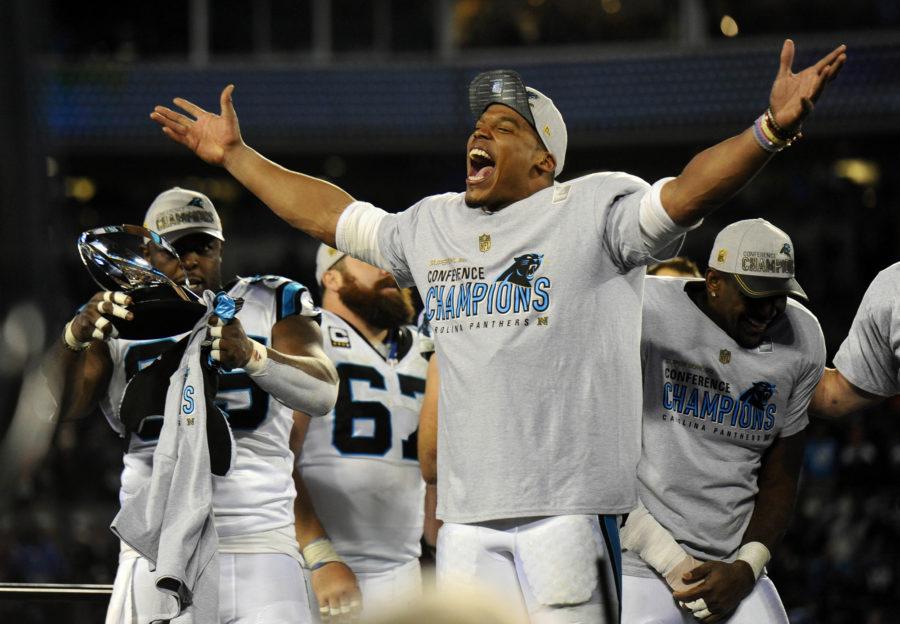Athletes' celebrations shouldn't be the focus of scrutiny
February 3, 2016
Odds are more than likely that Super Bowl 50 will be a routine affair.
The National Anthem will be sung, the halftime performance will be a distraction and one team will fight and claw its way to victory over the other. ‘Murica.
This particular Super Bowl is a statistical oddity, however, in that one of the starting quarterbacks is African-American.
When Carolina Panthers star Cam Newton takes the field against the Denver Broncos at San Francisco’s Levi’s Stadium, he will become only the sixth African-American quarterback in 50 years to start in the Super Bowl.
The previous five black quarterbacks to appear in the NFL’s championship game are Russell Wilson of the Seattle Seahawks, Colin Kaepernick of the San Francisco 49ers, Donovan McNabb of the Philadelphia Eagles and Steve McNair of the Tennessee Titans.
Get The Daily Illini in your inbox!
The attention Newton receives as a football player should be primarily for his abilities, like most other athletes. But as an African-American athlete playing a traditionally white position, the conversation surrounding Newton more often involves the ugliness of America’s relationship with racism than it does football.
In a press conference Jan. 27, Newton acknowledged as much when he addressed the elephant in the room, stating that the amount of criticism he faces is because he is African-American.
“I’m an African-American quarterback that scares people because they haven’t seen nothing that they can compare me to,” Newton said. [http://www.nytimes.com/2016/01/30/sports/football/cam-newton-doesnt-dance-around-racism-issues.html?_r=0]
Newton certainly has brought some new things to the playing field. His post-touchdown celebrations, such as the “dab,” have taken the sports and popular culture worlds by storm.
It’s fair to suggest that there is currently no other player in the NFL quite like Newton; however, some fans appear to be viewing Newton’s uniqueness as a negative.
A major part of football’s appeal is that all you need to play is a field and a ball. It’s that simple. It is a game that was created with no race or economic background in mind.
That’s why scrutinizing Newton for celebrating a successful play, as so many other players do, is so confusing. If not his race, what’s the difference?
Former Denver Broncos quarterback Tim Tebow, whose touchdown celebration “Tebowing” made him a household name, received mostly positive media coverage and fan reaction for his trademark celebration. And Green Bay Packers quarterback Aaron Rodgers isn’t banned from Soldier Field for doing his “discount double check” celebration every time he throw two to three touchdowns a game against the Bears.
I wish he were banned, but only because as a Bears fan, I believe the entire Packers organization and fanbase are made up of useless Cheeseheads.
The only difference between Newton and other quarterbacks with similarly well-known celebrations is race, and Newton is the only one criticized for his actions.
After the Panthers beat the Seahawks 31-24 in the NFL playoffs earlier this month, an elated Newton snatched a “12” flag handed to him by a Seahawks fan and euphorically and dismissively threw it on the ground. This was particularly insulting because “12” signifies the role of fans in the Seahawks organization.
The incident made national news, and an online petition was started to ban Newton from The Seahawks stadium for the 2016-2017, which the petition’s creator suggested “should teach (Newton) to put this arrogance in check.”
It seems as if some people expected Newton to bow graciously as he accepted his opponent’s flag, give it a kiss and then sleep with it under his pillow, as if any other quarterback in the NFL would have done the same.
While being quoted for an article in USA Today, Cynthia Frisby, an associate professor of communications at the University of Missouri who has studied the stereotyping of black athletes, suggested that African-American players are judged by the ‘illusory correlation’ theory. In this case, the illusory correlation refers to the false association between membership in a statistical minority group, such as African Americans, and a rare, typically negative, behavior.
“When you have a minority or somebody that stands out, you tend to make correlations that are usually wrong. . . . because it fits in our typical stereotypes,” Frisby said. [http://www.usatoday.com/story/sports/columnist/nancy-armour/2016/01/28/cam-newton-dabbing-black-quarterback-super-bowl-racism/79485258/]
So when you’re watching the Super Bowl on Sunday, focus on the commercials, or the halftime show or even the actual game being played instead of the personality of those who are playing in it.
If Newton and other African-American athletes must prove their worth and ability against the very subconscious of their naysayers, then this country has a much bigger problem than anything that can be resolved on a football field.
Jessie is a junior in Media.







